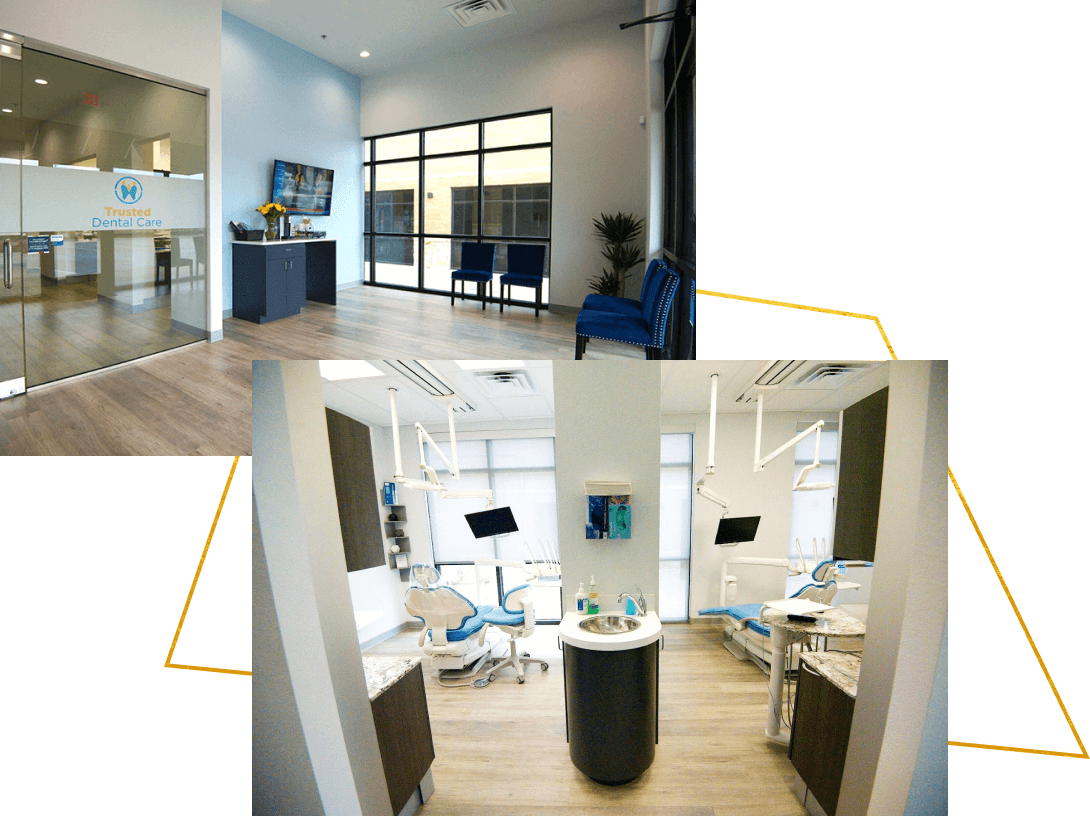Visit Our Wylie Dentist to Eliminate Your Tooth Pain
At Trusted Dental Care, we understand how tooth pain and infection can disrupt your daily life. Our skilled team, led by Dr. Fesaha Gebrehiwot, is dedicated to providing compassionate, high-quality root canal therapy that saves your natural teeth and restores your oral health. With advanced technology and personalized care, we make your root canal experience comfortable, efficient, and successful.
Let’s get an appointment scheduled! Contact our Wylie dentist near you today by calling(214) 702-0446. We welcome new patients.
Complex Cases? Trust Our Expertise for Advanced Root Canal Dental Treatments
Some root canal treatments require specialized care, such as multi-visit therapy for severe infections or retreatment of previous root canals. Our Wylie dentists’ advanced training and use of surgical microscopes enable us to handle even the most challenging cases with outstanding success rates.
Root canal therapy is just one part of our comprehensive dental services designed to keep your entire family’s smiles healthy and beautiful. From preventive care to smile makeovers and restorative dentistry, our team is here to provide the best dental experience for adults and children alike.
Additional Root Canal Therapy Resources
See what some of our Trusted Dental Care patients are saying:
- “The team at Trusted Dental really went above and beyond to make sure I was comfortable and had full understanding of the treatment I was getting. I was holding off on getting a root canal because of horror stories I would hear but Dr G did an amazing job and I felt 0 pain . My crown fit comfortably and 0 complaints overall. Thank you Trusted Dental!!!” – Erika M.
- “The whole staff were wonderful. I went there nervous as heck but they were very accommodating and friendly and made me feel less anxious. I had to get a root canal and when i say i felt nothing, i legit felt anything. They’re very good at there jobs!” – Dark A.

What Is Root Canal Therapy and Why Is It Important?
Root canal therapy is a specialized dental procedure designed to treat infection deep inside your tooth’s pulp, the soft tissue containing nerves and blood vessels. When this tissue becomes infected due to decay, cracks, or trauma, root canal treatment removes the infection, cleans the canals, and seals the tooth to prevent further damage.
Preserving your natural tooth through root canal therapy helps you avoid extraction, maintain proper chewing function, and protect surrounding teeth from shifting. At Trusted Dental Care, we prioritize saving your smile with effective, minimally invasive treatment.
5 Signs You May Need a Root Canal Treatment: Don’t Ignore These Symptoms
Recognizing the need for root canal treatment early can save you from more extensive dental problems. Contact our Wylie dental clinic if you experience:
- Persistent tooth pain or sensitivity to hot and cold
- Severe discomfort when chewing or biting
- Darkening or discoloration of a tooth
- Swelling or tenderness in nearby gums
- Prolonged sensitivity after the stimulus is removed
To determine your candidacy, our dentist in Wylie will perform a thorough examination, including clinical evaluation and X-rays, to assess the tooth and surrounding structures. Contact our Wylie dental office today at(214) 702-0446.
Benefits of Root Canal Therapy
- RelievesPain: One of the primary benefits of root canal treatment is the relief of severe toothache caused by infection or inflammation of the dental pulp. The procedure removes the source of pain, allowing patients to experience immediate relief.
- Saves Natural Teeth: Preserving natural teeth is always the best option whenever possible. Root canal therapy can save a severely damaged and infected tooth from extraction, maintaining the natural appearance and functionality of the tooth.
- Restores Oral Health: By removing the infected pulp and eliminating the infection, root canal therapy restores oral health. This prevents the spread of infection to neighboring teeth and reduces the risk of complications, such as abscess formation.
- Efficient and Cost-Effective: Root canal treatment is a cost-effective solution compared to tooth extraction followed by tooth replacement options like dental implants or bridges. It also requires fewer dental visits, making it a time-efficient procedure.

What to Expect During Your Root Canal Procedure at Trusted Dental Care
Step 1: Comprehensive Evaluation and Digital Imaging
Using advanced digital X-rays and 3D imaging, our dental team will carefully assess the extent of infection and plan your treatment with precision.
Step 2: Comfortable Sedation Options
Local anesthesia ensures your tooth and the surrounding area are numb. For patients feeling anxious, nitrous oxide or other dental sedation methods are available to keep you relaxed throughout the procedure.
Step 3: Cleaning and Sealing
Our trusted dentist removes infected pulp tissue, thoroughly cleans and shapes the root canals, and seals the tooth with biocompatible materials to prevent reinfection.
Step 4: Restoration and Follow-Up Care
After root canal therapy, Dr. G will place crowns or fillings that protect your tooth and restore full function.
Managing Recovery: Tips for a Smooth Healing Process
Post-treatment discomfort is typically mild and manageable with over-the-counter pain relievers. To support healing:
- Avoid chewing on the treated tooth until fully restored
- Maintain excellent oral hygiene, being gentle around the area
- Contact Trusted Dental Care immediately if you experience unusual pain, swelling, or if a temporary filling becomes loose

Frequently Asked Questions
Root canal treatment is generally no more painful than getting a regular filling. With modern anesthesia and sedation options like nitrous oxide, most patients feel little to no discomfort during the procedure.
The treatment typically takes between 30 to 90 minutes per tooth. Some complex cases or retreatments may require multiple visits.
Yes, placing a crown or other restoration after root canal therapy is important to protect the tooth and restore its function.
Many dental insurance plans cover root canal therapy. It’s best to check with your provider and our dental office to understand your coverage and treatment options.
Ready to Save Your Tooth and Restore Your Smile?
Don’t let a tooth infection disrupt your life. Schedule your consultation at Trusted Dental Care today and take the first step toward a pain-free, healthy smile. Our friendly dentist is ready to welcome you and provide the amazing care you deserve.
Call us now at(214) 702-0446 or book your appointment online; your best smile awaits!